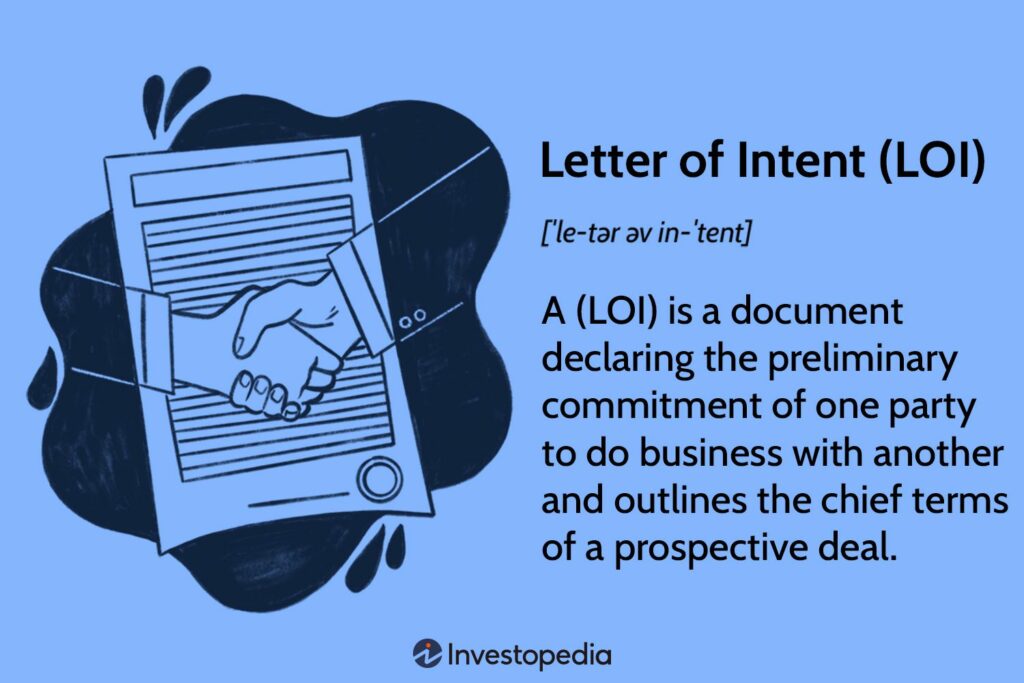What is the purpose of a commercial real estate letter of intent?
Black’s Law Dictionary – A binding letter of intent is customarily employed to reduce to writing a preliminary understanding of parties who intend to enter into a contract, or who intend to take some other action such as merger of companies. An agreement to agree to something in the future. First Nat. Mortgage Co. v. Federal Realty Inv. Trust, 631 F. 3d 1058 – CA Court of Appeals, 9th Circuit 2011; Copeland v. Baskin Robbins USA, 117 Cal. Rptr. 2d 875 – Cal: Court of Appeal, 2nd Appellate Dist., 7th Div. 2002.

A Commercial Real Estate Letter of Intent (LOI) is a document that is designed to outline the terms and conditions of a “potential” commercial real estate transaction between a buyer and a seller. Many times, this is merely the starting point of negotiations between a purchaser and a seller which is commonly drafted by a purchaser’s broker or attorney. It is typically a non-binding agreement that serves as a preliminary step in the negotiation process before the parties enter into a formal and legally binding contract, such as a purchase and sale agreement. However, if the document clearly expresses a party’s intent to be bound and has included all the essential terms for a binding contract, then it quite possibly could be an enforceable contract which we discuss below.
Line of Demarcation
There is a very thin, but extremely significant line of demarcation between someone’s intention and another’s commitment when it comes to commercial real estate transactions. All potential transactions, acquisitions or dispositions usually begin with good intentions and aspirations. However, any intentions are pointless in a commercial real estate deal unless the buyer and seller transform their mutual intentions into actual – and legally enforceable – binding bargained for exchange or promise. An offer of all the necessary terms, unequivocal acceptance of those terms, and adequate consideration in both directions can be enough for a binding document in most courts’ eyes.

The term of art, “letter of intent” sits in the crosshairs of intention and commitment in thousands of commercial real estate transactions. These documents predictably set forth the broad strokes – or even some critical details – of a proposed commercial transaction, and by executing signatures, both parties can express their unwavering intention to move forward with the transaction. But if one party has cold feet, opts out and abandons ship, can the other party seek to enforce that letter of intent as they would a binding contract?
State to state, the nuances of black letter law regarding enforceable contractual status of letters of intent vary, but the basic guiding principle is that letters of intent can be binding and enforceable contracts if:
- The parties have manifested their unequivocal intent to be bound by the letter’s terms; and
- The letter of intent includes the agreement’s essential terms to be considered a complete contract.
Lacking one of these elements, a court or arbitrator will likely find the letter of intent is merely an unenforceable “agreement to agree” in the future.

Buyer and Seller Must Clearly Express Their Intent to Be Bound
In the universe of commercial real estate, a Letter of Intent (LOI) can encompass a clear commitment from both involved parties, explicitly stating their intention to be legally bound by its terms. Such a document may intricately outline the rights and remedies available in the event of a party choosing to withdraw from the proposed transaction. Nevertheless, it is not uncommon for LOIs to lack a direct and unequivocal declaration of intent.
In instances where an LOI does not overtly express a commitment to be bound, a party aiming to enforce its terms must artfully and cleverly persuade the court or arbitrator that, despite the absence of explicit language, the parties did indeed intend to be legally bound by the terms articulated in the LOI at the time of its execution. This nuanced approach underscores the importance of careful interpretation and contextual analysis in the adjudication of commercial real estate matters.
In the evaluation of whether an LOI is intended to form a binding and enforceable contract, a judge or arbitrator will meticulously examine the language employed, or the absence thereof, in conjunction with the facts and circumstances surrounding the negotiation, drafting, and execution of the document.
Leaving the determination of parties’ intent to a judge or arbitrator introduces an element of uncertainty and opens the door to potential liability for a party that perceives the LOI as a mere record of good faith and aspirational intentions. To mitigate this risk and ensure clarity, it is imperative that a LOI pertaining to a commercial real estate transaction explicitly and precisely declares whether the parties intend for the document to give rise to legally binding obligations. Such clarity not only minimizes ambiguity but also establishes a framework for the parties’ expectations and responsibilities, contributing to a more secure and predictable transactional process.
A Letter of Intent Must Contain the Deal’s Essential Terms to Be Enforceable
While a Letter of Intent (LOI) stating, “Party A agrees to sell its commercial property to Party B and Party B agrees to buy it,” may signal a mutual commitment to a transaction, its mere existence does not confer enforceability. Critical to the judicial enforcement of a contract is the presence of essential terms encapsulating the “what,” “when,” “how,” and “how much” aspects of the agreement.
A court or arbitrator will most certainly refrain from enforcing a purported contract if these fundamental components remain subject to future negotiation and consideration. In essence, if the specifics crucial to the deal’s execution and completion are left open-ended, the judicial system lacks a definitive basis upon which to adjudicate and enforce the terms of the LOI. Therefore, a sophisticated approach to LOIs in the world of commercial real estate demands a meticulous inclusion of these essential details to fortify the legal standing of the document and facilitate a smoother transition from negotiation to contractual execution.
If the parties want their LOI to create enforceable obligations, it must contain such fundamental terms as:
- Identification of Parties: Clearly state the names and contact information of the buyer and seller.
- Property Description: Provide details about the property involved in the transaction, including its address, size, and any other relevant information.
- Purchase Price: Specify the proposed purchase price or a method for determining the purchase price. This may also include information about the earnest money deposit.
- Due Diligence Period: Define the period during which the buyer can conduct inspections, investigations, and other due diligence activities on the property.
- Closing Date: Specify the anticipated date for the closing of the transaction. This is when the property officially changes hands.
- Conditions of Closing: Outline any conditions that must be met before the transaction can be completed, such as obtaining financing or resolving specific issues related to the property.
- Financing Terms: If applicable, include details about the financing arrangements, including the amount, terms, and conditions.
- Lease Terms: If the property is income-generating and there are existing leases, outline any relevant details regarding leases, tenants, and rental income; and any assignments that may be forthcoming.
- Exclusivity: Determine whether the buyer has an exclusive right to negotiate with the seller during a specified period.
- Confidentiality: Include a confidentiality clause to protect sensitive information shared during the negotiation process.
Cautionary Disclaimer Language Will Help Prevent Misunderstandings
If you insist on drafting and executing an LOI in pursuit of your commercial property purchase, consider adding some cautionary disclaimer language – see the language below as an example. It is imperative that you have a competent real estate attorney to help you by reviewing and or drafting your LOI for you.

This LOI, while non-binding, serves as the foundation for the negotiation of a comprehensive written agreement, which will encompass material terms not explicitly addressed herein. It is imperative to note that this letter does not establish an exclusive right to negotiate nor impose an obligation to negotiate in good faith. Each party retains the unilateral discretion to terminate negotiations at their sole discretion.
Moreover, any partial performance by either party in adherence to the terms outlined in this letter, or the engagement in due diligence or other preparatory activities related to the consummation of the transaction, shall not be construed as evidence of an intent by either party to be legally bound by the provisions set forth herein. The subsequent approval or acknowledgment of an agreement via email, text, or any other electronic communication service remains non-binding upon either party.
It is explicitly underscored that the parties shall not be held bound by an agreement until they have collectively reviewed, approved, executed, and delivered a final and definitive written agreement. This emphasis on a formal, documented agreement underscores the precision and gravity inherent in the ultimate commitment to contractual obligations.
For individuals contemplating the acquisition or disposition of commercial real estate, a Letter of Intent (LOI) can function as a pivotal and strategic roadmap, steering the parties through the intricate process ahead. Nevertheless, the efficacy of the LOI in ushering the deal to fruition is contingent upon meticulous and transparent drafting that impeccably mirrors the shared intentions of the parties, encapsulating the indispensable terms integral to the transaction. In the realm of sophisticated commercial real estate transactions, the careful calibration of the LOI becomes paramount, as its ability to shepherd the deal to its ultimate destination hinges on the precision and clarity with which the mutual understanding is articulated.
Final Thoughts
In search of a trustworthy and professional commercial property management collaborator, Esquire Property Management Group exemplifies a continuous and steadfast commitment to adhering to ethical and legal standards more than other commercial property management teams as we understand the importance of drafting commercial property transaction documents. We perform these legally related tasks for our clients as we have a licensed real estate attorney on staff.
David currently is the broker/owner of several real estate related businesses which manage and maintain 300+ client properties on the San Francisco Peninsula.
Trust, transparency, and performance guarantees are the foundation of these businesses. David challenges anyone to find a PM professional that offers services similar - extensive education, customer service, and performance guarantees.
David also provides consulting for his clients on property development feasibility, construction, and complex real estate transactions.
David has authored a published law review article, three real estate books, and over 150+ real estate blog articles.
- “Wildfires, Insurance & Mortgages: Will Your Home Survive the Financial Aftermath?” - March 3, 2025
- What’s Driving California’s Commercial Real Estate Shakeup? - February 27, 2025
- Critical Issues in Triple Net Leases Investors Should Know - February 14, 2025

